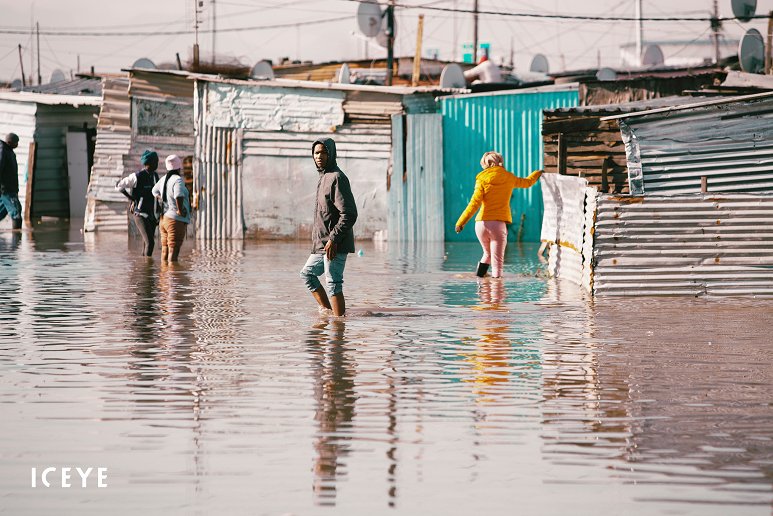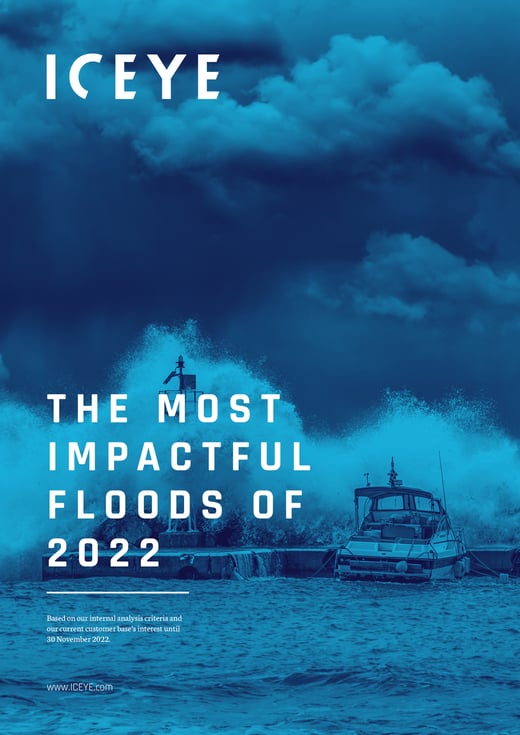Contact us
Get in touch with our experts to find out the possibilities daily truth data holds for your organization.
Persistent Monitoring
Natural catastrophe solutions
07 December 2022 | Solutions
5 min read
Solutions Marketing Manager, ICEYE

As we approach year-end, it is clear that 2022 has been another year of extreme natural catastrophes, with a sizable gap between economic losses and the claims paid out by insurance companies, often referred to as the insurance 'protection gap'.
According to the SwissRe Institute, natural catastrophes caused an estimated USD 115 billion of insured losses in 2022 to date, which is well above the 10-year average of USD 81 billion. Even in the United States or Europe, where insurance penetration is typically high, flood risk is seriously underinsured. It is estimated that Hurricane Ian alone caused insured losses of USD 50–65 billion, making it the single largest loss-causing event of 2022.
Notably, the reinsurer said the 2022 loss experience, compounded by the previous five years, "emphasises the need to adopt a more forward-looking approach for all perils". Data for so-called secondary perils such as floods and hail need more industry attention.

Get reliable flood extent and depth data for the most significant flood events we observed in North America, Europe, Australia and Japan throughout 2022.
As the climate warms, such extremes will become more frequent and intense. Exposures will also increase due to macro-trends such as urbanisation and population growth.
If events which were previously considered 1-in-100-year events start occurring every ten years, questions surrounding insurability will inevitably arise. Many reinsurance carriers are already reassessing their appetite for catastrophe risk, with some reducing how much capacity they are willing to offer.
As Martin Bertogg, head of Catastrophe Perils at SwissRe, noted, "urban development, wealth accumulation in disaster-prone areas, inflation and climate change are key factors at play, turning extreme weather into ever-rising natural catastrophe losses."
"When Hurricane Andrew struck 30 years ago, a $20 billion loss event had never occurred before and now there have been seven such hurricanes in just the past six years."
How to fight systemic risks such as cyber or climate change and "insure the uninsurable" is a topic that was discussed by ICEYE's Global Head of Insurance, Stephen Lathrope, on a panel at the Insurance Insider's London Market Conference 2022.
To help the insurance industry maintain its essential economic role in assisting societies to recover from major events, it needs more and better data to measure its potential exposure to systemic risk and improve pre-loss mitigation.
This is where ICEYE's earth observation data comes in, offering insights into which properties are most exposed and which buildings are more likely to be affected than others. As Lathrope noted at the London Market Conference, such insights can inform building regulations, urban planning and flood resilience.
There are also existing models for pooling potentially systemic risks. From terrorism risk in the US to floods in the UK and hurricanes in the Caribbean, public-private solutions are one way that catastrophic risks can remain insurable in the private market.
One of the main takeaways from this year's COP27 meeting was the benefits of 'blended finance' in building resilience to climate change in some of the world's most impacted nations.
Whereas last year's Glasgow meeting had been focused on making Net Zero commitments, the actors gathering in Sharm el-Sheikh in November were more focused on discussing tangible action to mitigate the impacts of a changing climate.
Increasingly, decision-makers recognise that successful action requires multi-lateral cooperation and adequate funding, especially in poorer countries that are likely to be disproportionately impacted by climate extremes.
Blended finance combines private and public funding towards impactful investments that might be unable to proceed on strictly commercial terms.
Nigeria is the latest country to benefit. Announced during COP27, the Insurance Development Forum has joined forces with the UNDP, German Government and Lagos State Government to launch a €1.6 flood resilience scheme for the country's capital.
ICEYE's earth observation data is critical to the project, which is led by AXA Climate and Swiss Re and harnesses parametric insurance and pays out based on the magnitude of a particular flood event.
As Michel Liès, IDF Steering Committee chairman, and chairman of Zurich Insurance Group, said: “Our actions at COP27 – including the announcement of another in-country sovereign risk transfer project - are a testament to how insurance can influence systemic change, and what can be achieved through true cross-sector collaboration." 
You can learn more about this project via The Insurer's website.
28 October 2025
Flood Ready: How insurers can act faster with satellite insights
Discover how satellite flood monitoring helps insurers gain real-time situational awareness and...
Read more about Flood Ready: How insurers can act faster with satellite insights →15 October 2025
From forecast to fact: Multi-peril data for insurers
ICEYE's Monte Carlo workshop revealed how SAR satellite data transforms hurricane response and...
Read more about From forecast to fact: Multi-peril data for insurers →11 June 2025
6 Data-driven strategies emergency managers should use for hurricane preparedness
How Emergency Managers can ensure data readiness ahead of hurricane seasons.
Read more about 6 Data-driven strategies emergency managers should use for hurricane preparedness →